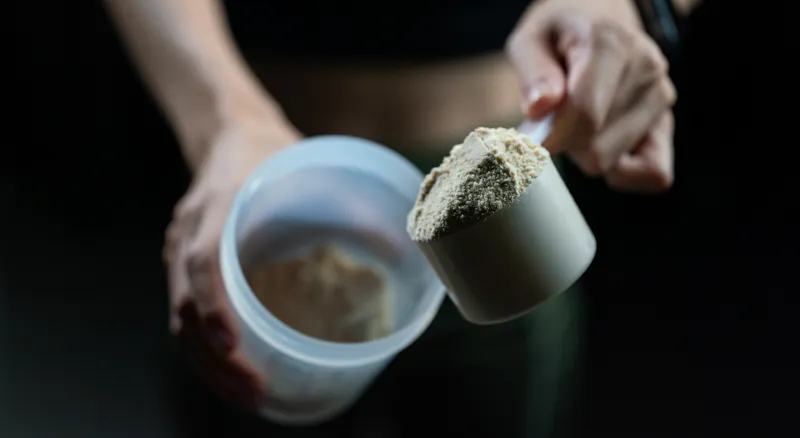Can creatine help with depression symptoms? The latest research suggests it might



Depression is very common, with roughly 1 in 4 women and 1 in 10 men developing depression severe enough to need treatment. This typically means therapy, medication, or both.
But roughly one-third don’t get much relief from first-line antidepressants, meaning researchers are continually exploring alternative options.
New research has focused on creatine, a familiar supplement for bodybuilders and fitness enthusiasts. Could it act as an aid alongside established treatments?
How creatine works in the brain
Creatine is a naturally occurring compound that helps your body generate ATP, the main energy source of cells. Like petrol in a car, when ATP is broken down into its constituent parts, the resulting energy is used to fuel countless cellular processes.
The body stores creatine as phosphocreatine–essentially, a reserve battery that’s ready to use when needed. But in people with depression, the brain energy metabolism can be disrupted, causing lower phosphocreatine stores in the brain.
Theoretically, taking a creatine supplement might aid in boosting reserves. Having more energy available may improve how the brain’s cells communicate with each other and form new connections, potentially reducing depression symptoms.
The latest research on depression and creatine
Researchers have been steadily investigating creatine’s mental health benefits over the years. A recent clinical study published in European Neuropsychopharmacology has shown that creatine supplements may improve depression symptoms when used alongside talk therapy.
Researchers recruited around 100 adults and gave them either:
- 5 grams of creatine per day plus cognitive behavioural therapy (CBT)
- A placebo plus CBT
After eight weeks, those taking creatine had a bigger drop in their depression scores–about 5 points–compared to the placebo group.
This study was a randomised controlled trial (RCT) that was double-blind and controlled with a placebo. Being double-blind means that neither the researchers nor the participants knew who was receiving the placebo, which gives stronger evidence than other studies.
While this was still a small pilot study, it does indicate that creatine could play a supportive role in mood treatment. Larger, longer trials are needed before creatine can be recommended as a standard therapy.
While earlier studies were small in size or observational in nature, they point in the same direction.
One large U.S. analysis found that adults who consumed more creatine through their diet had around 40% lower odds of depression, particularly among women. Animal studies have also shown a reduction in depressive behaviours that’s more pronounced in females.
Small pilot trials combining creatine with antidepressant medication have also reported improvements in symptoms and increased brain phosphocreatine stores. This suggests that creatine may enhance the brain’s energy metabolism, which means it could complement existing depression treatments.
What we don’t know
While this recent study gives exciting insight into creatine’s potential, there’s still a lot we don’t know. The researchers tested creatine alongside CBT, rather than isolating its effect on its own.
And that’s for good reason–when studying people with depression, it wouldn’t be ethical to withhold proven treatments and risk causing them harm. This means that we can only see creatine’s benefits when combined with existing treatment options.
Another uncertainty is the optimal dose. This study used 5 grams per day, a common amount in sports science research that’s considered safe.
However, we don’t yet know if that’s the ideal dose for mood support–or whether higher or lower amounts would make a difference. These are questions future studies will need to explore.
Should you try it?
So, should everyone with depression start taking creatine? Not necessarily. While early research looks promising, creatine isn’t an approved treatment for depression, and studies so far are small and exploratory.
Creatine is one of the most well-researched supplements in sports science and is generally considered safe for most healthy adults. Some people notice side effects, such as a small increase in water weight or occasional stomach upset, but these are typically mild.
If you’re considering trying it, it’s best to discuss it with your healthcare professional first, especially if you’re taking medication or have any medical conditions. It should always be seen as a complement, not a replacement, for proven treatments such as therapy or prescribed medication.
Takeaway
Creatine isn't a magic bullet for mental health, but it might be a helpful addition for people with depression. It also boasts a number of proven benefits, like boosting high-intensity exercise performance, aiding in muscle recovery, and protecting against injuries and concussions.
Current research has shown a reduction in depression symptoms when used alongside existing, proven treatments (like medication and CBT). For now, it’s best viewed as a potential add-on option, and future research will reveal whether it holds up as a standalone therapy.
Disclaimer: This information is for general educational purposes only and isn’t a substitute for professional medical advice, diagnosis, or treatment. Always speak with a qualified healthcare professional first if you have concerns about your mental health. If you’re having a medical emergency, please seek help by contacting your local emergency services.
- Bakian, A., et al. (2020). Dietary creatine intake and depression risk among U.S. adults. https://www.nature.com/articles/s41398-020-0741-x
- Kankar, S. et al. (2021). Sex-Based Impact of Creatine Supplementation on Depressive Symptoms, Brain Serotonin and SSRI Efficacy in an Animal Model of Treatment-Resistant Depression. https://pubmed.ncbi.nlm.nih.gov/34360959/
- Kious, B. et al. (2017). An Open-Label Pilot Study of Combined Augmentation With Creatine Monohydrate and 5-Hydroxytryptophan for Selective Serotonin Reuptake Inhibitor– or Serotonin-Norepinephrine Reuptake Inhibitor–Resistant Depression in Adult Women. https://journals.lww.com/psychopharmacology/abstract/2017/10000/an_open_label_pilot_study_of_combined_augmentation.16.aspx
- Kreider, R. et al. (2017). International Society of Sports Nutrition position stand: safety and efficacy of creatine supplementation in exercise, sport, and medicine. https://jissn.biomedcentral.com/articles/10.1186/s12970-017-0173-z#Sec19
- Pigott, H., et al. (2023). What are the treatment remission, response and extent of improvement rates after up to four trials of antidepressant therapies in real-world depressed patients? A reanalysis of the STAR*D study’s patient-level data with fidelity to the original research protocol. https://bmjopen.bmj.com/content/13/7/e063095.info
- Sherpa, N. et al. (2025). Efficacy and safety profile of oral creatine monohydrate in add-on to cognitive-behavioural therapy in depression: An 8-week pilot, double-blind, randomised, placebo-controlled feasibility and exploratory trial in an under-resourced area. https://www.sciencedirect.com/science/article/pii/S0924977X24007405#bib0027
- Yoon, S. et al. (2016). Effects of Creatine Monohydrate Augmentation on Brain Metabolic and Network Outcome Measures in Women With Major Depressive Disorder. https://pubmed.ncbi.nlm.nih.gov/26822799/